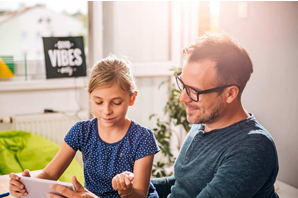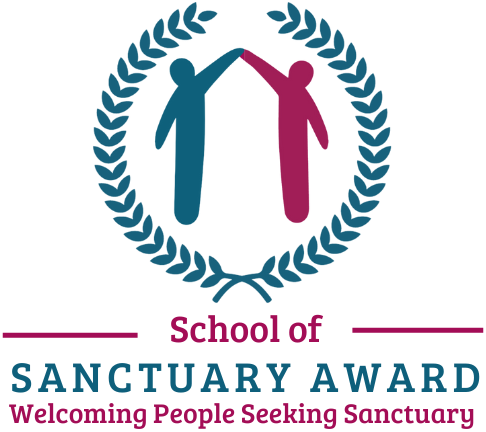Wellbeing & Online Safety For Parents
Staff in schools are described as acting in ‘loco parentis’. We have a duty of care towards the students under our supervision, as well as promoting the safety and welfare of the students in our care.
Maintaining good behaviour is the responsibility of all staff, governors and parents/ carers. We expect our staff and parents to be a good role model for our students as we develop their attitudes for all aspects of life. We ensure all staff follow the expected code of conduct and parents/carers their child/young person's home/ school agreement.
We have a culture of positive recognition at school, and the dissemination of rewards provides an opportunity for all staff to reinforce the school’s culture and ethos. Positive reinforcements and rewards are applied clearly and fairly to reinforce the routines, expectations, and norms of our culture.
We ensure all parents/carers of students attending MHS:
· are informed about school rules, relevant policies and the expected conduct of all students and staff working in school
· expect that students with any form of SEND and including recognised SEMH have appropriate learning opportunities
· are informed about the school's complaints procedure..
Students have regular contact with their form tutors and are aware that they can approach any adult in school if they have any concerns.
Key school contacts can be found by clicking here.
Further key information about our safeguarding policies and procedures can be found here.
For further advice and guidance on how you can help safeguard and support a young person, please visit the Keeping Bristol Safe Partnership website that has a wealth of advice on matters that affect young people.
For wellbeing advice for students please click here
You can find the E-ACT policy for Online Safety by clicking here.
You can find the E-ACT policy for Pupil Mental Health and Wellbeing Policy by clicking here.
10 Top Tips For Parents to Support Mental Health
Below are links and videos from SSS Learning that give their top ten tips for supporting children and parents themselves with their mental health.
Report Harmful Content
If you've experienced or witnessed harm online Report Harmful Content can help.
Report Harmful Content can help you to report harmful content online by providing up to date information on community standards and direct links to the correct reporting facilities across multiple platforms.
Useful Websites
National Bullying Helpline - A coalition of organisations and individuals, working together to achieve our vision to: stop bullying and create safer environments in which children and young people can live, grow, play and learn.
Childline - Get information and advice on a whole range of issues affecting children and young people.
Childnet - Top tips, competitions, blogs and advice to help you to use the internet safely, responsibly and positively.
CBBC Stay Safe - Tips and tricks you'll need to stay safe online, beat the cyber-bullies and become a super-surfer.
Digital Literacy & Citizenship - free materials designed to empower students to think critically, behave safely, and participate responsibility in the digital world.
Snapchat Support - Tips and resources to help you stay safe while using Snapchat, including how to report a safety concern.
UK Safer Internet Centre - Games, quizzes, films and advice to help you get the most out of the internet while staying safe online.
STAYING SAFE ONLINE
Internet Safety for children is important which has also been recognised through the Government's KCSIE 2023 (Keeping Children Safe in Education). We constantly review our internet safety procedures to ensure our pupils are not only protected from the dangers of the Internet but are also fully informed and educated on how best to deal with online threats and concerns.
Using the internet and mobile devices is central to many of our students’ lives. We recognise the enormous value these technologies have in helping our students learn and function effectively in the 21st Century.
With these opportunities comes the need to protect our students from the associated risks. We take e-safety very seriously. In addition to taking steps such as web filtering, we educate our students about the risks they face on-line and how they can protect themselves.Being educated about Internet Safety is an essential life skill. Providing children with the knowledge to protect themselves and their personal information is a key focus throughout our pupils’ digital learning.
All students are required to read and sign our IT Acceptable Use Policy, which describes the responsibilities students have when using IT.
You can find the E-ACT policy for Online Safety by clicking here.
Safer Internet Centre
Safer Internet Centre provides tips, advice, guides and resources to help keep your child safe online
As a parent or carer you play a key role in helping your child to stay safe online.
You don’t need to be an expert on the internet to help keep your child stay safe online.
Our advice and resources are here to support you as you support your child to use the internet safely, responsibility and positively.
For more information click here: Parents and Carers - UK Safer Internet Centre
E-SAFETY IN THE HOME
Having an e-safe environment is not as daunting as it may seem. Although the opportunities for connecting with others using technology is vast, and growing all the time, parents, carers and other responsible adults can make the environment safe with these helpful guides.
There are a number of useful websites that contain easily accessible information and guidance about e-Safety.
Internet Matters
Internet Matters is a not-for-profit organisation offering parents further resources to help them keep their children safer online; while supporting broadband parental controls.
Offering tips and advice - From age-specific online safety checklists to guides on how to set parental controls on a range of devices, you’ll find a host of practical tips to help children get the most out of their digital world.
Childnet
Childnet works directly with children and young people from the ages of 3-18, as well as parents, carers, teachers and professionals, finding out about their real experiences online, and the positive things they are doing.
ThinkUKnow
Thinkuknow is a site for students and parents/carers explaining internet dangers and how to stay in control.
CEOP
Are you worried about online sexual abuse or the way someone has been communicating with you online? Send a report to one of CEOP's Child Protection Advisors.
Online Safety Updates
Looking for advice about a particular app or website?
Please see our Online Safety Updates page for information about what to do to stay safe when using apps, games and websites.
ONLINE SAFETY UPDATES
Online Safety at Home
Sometimes use of the internet throws up unforeseen problems which you as a parent may need to address with your child. Understandably, you may initially feel uneasy with how best to resolve issues such as cyberbullying, viewing and/or sharing inappropriate content, sexting, or the amount of time your child spends online.
For help with setting parental controls, online gaming, mobile phones and the internet and any other concern around online safety in the home please visit Internet Matters for advice and video guides.
Online Sexual Harrassment - Things I Wish My Parents Had Known
Published by Dame Rachel de Souza DBE, Children’s Commissioner for England.
This guidance is based on the voices of young people giving adults their tips on how to tackle online sexual harrassment.
Things I Wish My Parents Had Known
Children, especially girls, talked about their experiences of sexualised bullying and peer on peer abuse and were calling firmly for more support, with most children saying they want that support to come from their parents or carers. A group of 16–21 year olds were asked to talk about what they think parents should know, and what they should say to their children when talking about sexualised bullying and the pressures of growing up online, and asked them to think back to when they were younger and discuss what their parents and carers did and said that was and was not helpful.





